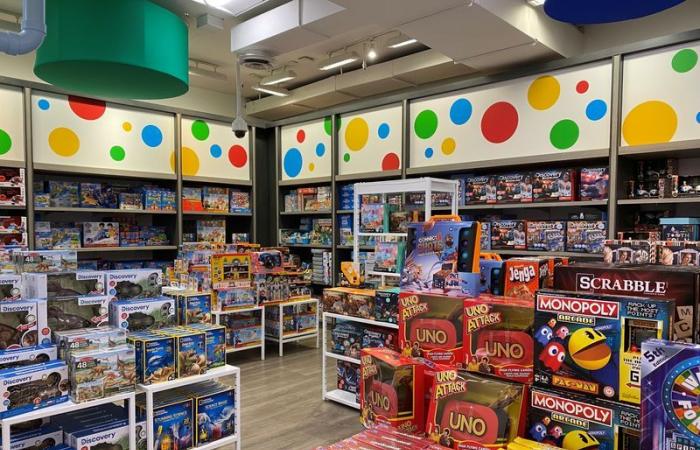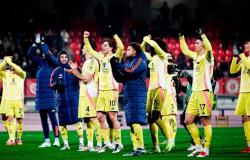With the incoming Trump administration promising a whole new round of tariffs on U.S. imports, Atlanta-based Kids2 and other toy makers are reviewing product lines, looking for ways to limit the cost of the new levies.
During the last trade war, Kids2 redesigned an infant seat so it could be converted into a swing by adding a moving part.
Design changes like this are almost magical: they made a 25% tariff disappear, because children’s chairs from China were subject to the tax, while swings were not and still are not.
Kids2 and other companies that make everything from Barbie dolls to sneakers are trying to figure out how to respond to Trump’s latest tariff threats. Many have already moved parts of production from China some time ago, due to the worsening of relations with this country.
The result of the shift in supply chains is a surge in imports of consumer goods into the United States from Vietnam and Mexico. Mexico will become the largest source of imported goods in the United States in 2023, surpassing China for the first time in more than two decades.
Mattel’s moves, for example, are emblematic of this change. Chief Financial Officer Anthony DiSilvestro reminded investors earlier this month that by next year, the El Segundo, Calif.-based toy giant will source less than 40% of its products from China, compared to the industry average which exceeds 80%.
“We have teams of people engaged today in analyzing and planning for different pricing scenarios,” DiSilvestro said. “And of course our actions will depend on what actually happens, which seems to change from day to day and week to week.”
Some companies are moving extra inventory to the U.S. to get ahead of possible new levies and the threat of further labor strife at East Coast ports, but this is limited — and presents its own set of risks.
Jay Foreman, CEO of Basic Fun, the Boca Raton, Fla.-based maker of Tonka trucks and K’nex building sets, said, “You can run into problems by bringing in the wrong product too soon — it eats up the flow of cash and the warehouses fill up”.
Foreman said moving toy production to other low-cost countries poses unique challenges, such as when it comes to product safety.
“No one worries that the spatula, the tennis racket or the tennis shoe will hurt them,” he said. “But everyone worries that toys will harm their children if they are not produced to good quality and tested properly.” He noted that China has built capacity and experience in the toy industry over the decades that others do not have.
REPOSITIONING, REDESIGNING
Kids2 is an example of the deep Chinese roots of the US toy industry. The company still produces about 90% in that country, including a good portion of its factory complex, which it expanded during the first Trump administration. Kids2 continues to invest in its Chinese operations, even as Trump promises tariffs on goods not yet touched by his first round of taxes.
The company said it is redoubling efforts to reduce costs by automating its China plant and consolidating suppliers — moves that Chief Operating Officer John Sikes said give it a cushion against future tariffs.
Sikes estimates that, to a point, the company could absorb the new tariffs through cost cuts and other moves to minimize price increases for consumers. “But anything above 25% will be a challenge,” he admits.
Kids2 is also ready to move more work out of China if necessary. It has built capacity to produce about 10% of its products in Vietnam and is evaluating options in India and other low-cost countries.
Companies also look for ways to design products to minimize tariffs. For the past three months, Kids2 has been focusing on this, Sikes said, and engineers have dedicated themselves to this task full time, along with designers and shipping experts. The company estimates it will take about another six months to review all of its products and look for ways, when possible, to do what they’ve done with swings. To be sure, not all of their projects can be changed at the rate level.
“For some things, like baby tubs and potties, it’s a matter of what is,” Sikes says. “There is no gray area, so there is no design solution for some products.”
Like many other toy makers, Kids2 also hopes to be insulated in any future trade wars. Toys were largely spared from heavy tariffs during the first Trump administration — along with ubiquitous consumer goods like cell phones and laptops — because political leaders are loath to raise the cost of something parents must buy for children .
In fact, during the 2021-2023 inflation surge — the largest since the 1980s — toy prices were one of the few categories that avoided large price increases. They have fallen nearly 4.4% over the past four years, according to Consumer Price Index data, while U.S. consumer goods prices have risen more than 20%.
Sikes said the company is pushing the message that it would be unwise to take steps that would raise toy prices — which would create new inflationary pressures on cash-strapped young parents and perhaps even discourage people from having children. The decline in birth rates has become a concern in many parts of the world.
“That’s why I’m not too worried about what might happen,” he said. “Because of the optics and the impact it could have on what we already know is a challenge globally.”






